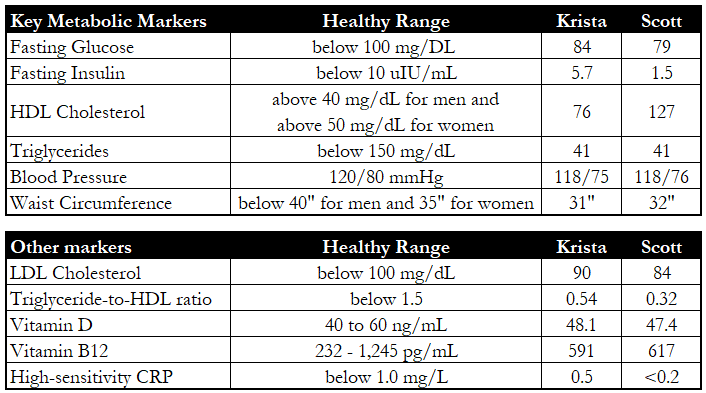For us, when February rolls around, it’s not just time for Punxsutawney Phil and Valentine’s Day.
It’s also time for our annual trip to our doctor for a checkup and blood work. Last month, we visited our doctor and talked about everything from the Shingles vaccine to when we should get our next colonoscopies to the pros/cons of prostate testing (for Scott of course!). It will probably not surprise you that we spent a fair amount of time talking about food and nutrition – for what it’s worth, we love that our doctor is completely on board with our “keep it simple and EAT REAL” approach!
We also rolled up our sleeves for the annual blood draw. We can’t help it, we are always a little anxious and excited to see how the lab results come back. Will our cholesterol be within a healthy range? What about our B12 and Vitamin D? Before we share our results, I want to share more about our thought process going into this year’s appointment.
Looking Through a Slightly Different Lens
This year, we decided to test for a few things that we hadn’t tested for in the past. This was mostly due to some research we had been doing, including a couple of books we read over the holidays:
Good Energy: The Surprising Connection Between Metabolism and Limitless Health by Dr. Casey Means and Calley Means
Stay Off My Operating Table by Dr. Philip Ovadia
Both of these doctors stopped practicing traditional medicine after becoming disenchanted and frustrated with our healthcare system. They both wanted to focus their efforts on addressing the root cause and preventing illness in the first place (vs. the traditional system which is overly focused on treating the symptoms by prescribing medications and procedures).
These two books happen to have a common theme running through them. They both make a compelling case that metabolic health is the foundation of overall well-being. Drawing from their expertise in medicine and personal experiences, they both present the case that poor metabolic function is at the root of most chronic diseases, and improving it is the key to living a long, healthy, and thriving life.
Dr. Means says…
In Good Energy, Dr. Casey Means explores how our cells’ ability to produce and use energy efficiently determines our overall health. She explains that when metabolism is functioning optimally, our bodies have stable energy levels, sharp cognitive function, and resistance to disease. However, when it’s impaired—due to poor diet, chronic stress, lack of movement, or sleep deprivation—it leads to inflammation, insulin resistance, and mitochondrial dysfunction, setting the stage for chronic illness.
We loved her insights on how REAL, nutrient-dense foods are a cornerstone to achieve good metabolic health. She also emphasizes regular movement and strength training, prioritizing sleep and stress management, eliminating environmental toxins, and monitoring key metabolic markers like glucose levels, insulin response, and inflammation.
Dr. Ovadia says…
As a cardiac surgeon, Dr. Philip Ovadia spent years performing heart surgeries on patients with advanced cardiovascular disease. Over time, he realized that most of them didn’t have to end up under his scalpel if they had prioritized metabolic health earlier in life.
Dr. Ovadia himself struggled with obesity and poor metabolic health before making changes to his lifestyle. He shares his view that your weight isn’t as important as your metabolic health to prevent heart disease and other chronic illnesses. He discusses his golden rule of metabolic health: “Eat REAL whole food.” Like Dr. Means, he also focuses on engaging in regular physical activity, managing stress, prioritizing sleep, and tracking key metabolic markers.
What is metabolic health?
Metabolic health refers to how well your body processes and utilizes energy. It’s a measure of how efficiently your metabolism functions to maintain stable blood sugar levels, healthy blood pressure, and balanced cholesterol. When your metabolic system is working optimally, you feel energized, are better able to maintain a healthy weight, and lower your risk of chronic diseases like diabetes, heart disease, and even cognitive decline. Of course, poor metabolic health can lead to insulin resistance and increased risk of these chronic conditions.
The Five Key Markers of Metabolic Health
Using this view of health, you are considered metabolically healthy if you meet these five criteria without the use of medication. Research suggests that only around 12% of American adults are metabolically healthy, using these five markers.
- Healthy blood sugar levels. A fasting blood glucose level below 100 mg/dL indicates good blood sugar control. Elevated levels can signal insulin resistance, which is a precursor to diabetes.
- Optimal blood pressure. A normal reading is around 120/80 mmHg. High blood pressure can damage your blood vessels, put a strain on your heart and increase the risk of cardiovascular disease.
- Balanced cholesterol and triglycerides. Relevant markers include HDL (“good”) cholesterol above 40 mg/dL for men and 50 mg/dL for women, while keeping triglycerides below 150 mg/dL. High triglycerides are seen as a predictor of chronic disease.
- Healthy waist circumference. Excess visceral fat around the abdomen is linked to insulin resistance and inflammation. A waist measurement below 40 inches for men and 35 inches for women is considered healthy. This is measured just above the top of your hip bone, at about the level of your belly button.
- Stable insulin levels. Even if fasting blood sugar appears normal, elevated fasting insulin levels can indicate early insulin resistance. The goal is to keep it below 10 uIU/mL.
Our Lab Results
Here we go! We are keeping it REAL and sharing our results with you! After a few slightly anxious days, the results arrived…
Our Reaction?
We were relieved and pleased with the results. Here were a few of our observations:
- We found it interesting how similar many of our numbers were. I guess this really isn’t surprising since we eat the same foods!
- Our daily multivitamin includes B12 (50 mcg) and we also take a daily Vitamin D3 (1,000 IU) which are helping to keep us in a good range.
- We were very happy with our High-Sensitivity CRP results. This measures inflammation in your body. There appears to be a strong relationship between inflammation and a variety of chronic health conditions. Dr. Means recommends checking this every year, “given how strong the relationship is between insulin resistance, oxidative stress, chronic inflammation, mitochondrial dysfunction, cell danger response, and the development of nearly every chronic disease and symptom facing people in the United States today.”
- Should we be concerned about Scott’s HDL? In the past, we were always told, “the higher the better – congratulations!” However, recent evidence indicates very high levels (> 80 mg/dL for men) may be associated with increased risk. We are doing more research on this one. Maybe this will be the subject of a future coaching tip?!
Zonya Says:
Congratulations Krista and Scott! Just think what your numbers would be if you had never embarked on this REAL food journey so many years ago?! These truly are fantastic numbers and, no doubt, you have changed the trajectory of your health! I would love to share if our members would be interested to see my numbers as well, which are…very much like yours I am proud to say!
- Fasting Glucose: 80
- HDL Cholesterol: 67
- Triglycerides: 56
- Blood Pressure: 118/64
- Waist Circumference: 32″
- LDL Cholesterol: 70
- Triglyceride to HDL ratio: .84
- Vitamin D: 50 (I take a supplement of 2,000 IU in the summer and 7,000 IU in the winter)
- Vitamin B12: 829 (I take a Cooper Complete multivitamin which has a fair amount of B12)
- High Sensitivity CRP: 0.18
It Really Does Work!
We are all MOST EXCITED about this as another indicator that our approach of “Keep It Simple and Eat REAL Food” really does work!
We keep hearing and reading more about metabolic health. It seems like the practice of monitoring these markers is increasing, especially with the prevalence of wearable technologies.
Has your doctor brought up metabolic health in your recent visits?
We would love to hear your experiences!
 LEARN MORE ABOUT THE NAPKIN!
LEARN MORE ABOUT THE NAPKIN!




Great lab numbers Krista and Scott!
Thank you Dee!
That’s wonderful! Congrats to all of you. You certainly are our inspiration.
Thank you and right back at ya! Thank you for keeping us inspired!
Wow what awesome lab numbers for all of you!! 😊 This makes me want to have awesome numbers too. I am a work in progress! I will get there. Thank you so much for sharing! 😊
You absolutely will get there and we can’t wait to hear about it! Thank you for your feedback and so glad this was helpful!
Thanks so much for the book recommendations and the education about high sensitivity CRP. Now I am curious what my number is. I had my blood tested last March so this is a perfect time to retest and have my doctor discuss metabolic health with me! Thanks for keeping it REAL by sharing your numbers. ❤️
Wow – nice to read this for you and to know it supports what you learned and now teach. I am interested in what you find out about HDL – kind of confusing and mine has been chronically lower. On the road – in the middle of our move – but checking in and keeping it real … thanks so much! I have my physical coming up – going to ask for these tests!! G
Thank you Greg! Moving can be so stressful, so hang in there and keep up the good work! Please keep us posted on your progress!
Thank you, very helpful information, really need to put away some of those meds and continue to Eat Real foods to replace them.
I don’t see your total cholesterol listed?? Is that for a reason? Not tested? Thanks!
Greg – Thank you for asking, we did not include the total cholesterol numbers only because they can be misleading. We felt like it was more helpful to share the individual numbers. For example, if you look at Scott’s total cholesterol it can be misleading because his HDL is higher. I hope that helps, thank you!